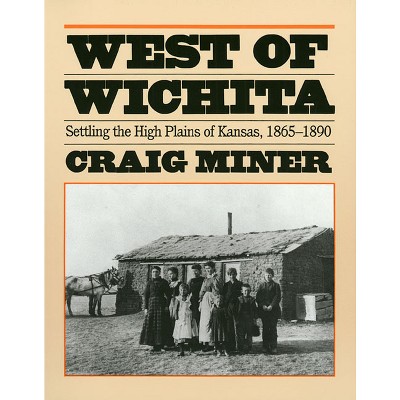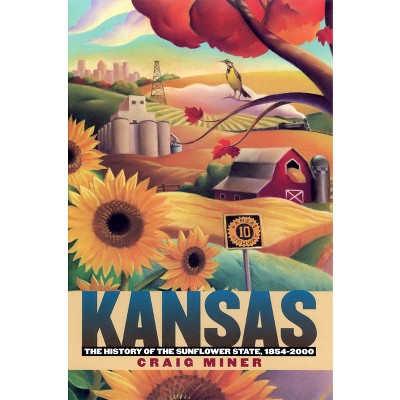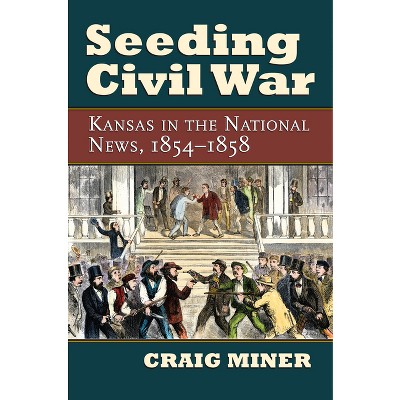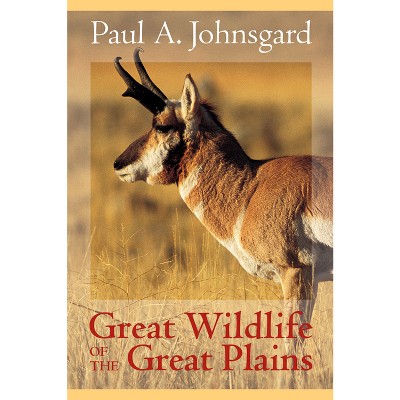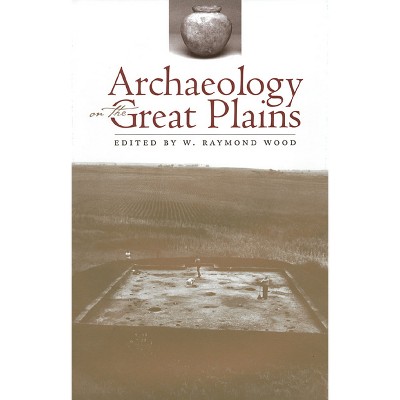Harvesting the High Plains - (Modern War Studies (Hardcover)) by Craig Miner (Hardcover)

About this item
Highlights
- The semiarid plains of western Kansas and eastern Colorado are hardly the setting for an agricultural empire, but it was here that former field hand John Kriss managed G-K Farms for Wichita entrepreneur Ray Garvey.
- Author(s): Craig Miner
- 240 Pages
- History, United States
- Series Name: Modern War Studies (Hardcover)
Description
Book Synopsis
The semiarid plains of western Kansas and eastern Colorado are hardly the setting for an agricultural empire, but it was here that former field hand John Kriss managed G-K Farms for Wichita entrepreneur Ray Garvey. Their enterprise became one of the largest wheat operations on the plains and yielded Kriss a one million bushel crop. Harvesting the High Plains is the rags-to-riches story of how Kriss applied hard work and common sense to make large-scale farming work under the most adverse conditions. Drawing on correspondence between Kriss and Garvey, it tells how the two men had to make innumerable decisions about the purchase of expensive machinery and of ever larger tracts of land, and how Kriss kept detailed records of crops and rainfall to manage the land carefully, farming thousands of acres in an environmentally sensitive way and retaining a viable operation even during the Dust Bowl years. In chronicling the story of Kriss's success, historian Craig Miner provides a bold counterpoint to the argument that large, technology-based farming is inherently bad or that only small farmers can be conscientious stewards of the land. He sets his narrative in the context of local and agricultural history-as well as the Kriss family's own story-in order to document the transition to mechanized, specialized farming on the plains. He addresses philosophical and historical questions about the relation between agriculture and nature in a semiarid region, showing that G-K Farms managed to strike a remarkable balance between profit and ecology. He also suggests that G-K may even have done its region more economic good than small farms simply by staying in business during bad times. The Kriss family still works the land, and although their operation is huge, it still depends on traditional family farming values and approaches. Harvesting the High Plains provides keen insights into their special approach to large-scale farming and gives a human face to the faceless statistics of other agricultural studies.From the Back Cover
The semiarid plains of western Kansas and eastern Colorado are hardly the setting for an agricultural empire, but it was here that former field hand John Kriss managed G-K Farms for Wichita entrepreneur Ray Garvey. Their enterprise became one of the largest wheat operations on the plains and yielded Kriss a one million bushel crop. Harvesting the High Plains is the rags-to-riches story of how Kriss applied hard work and common sense to make large-scale farming work under the most adverse conditions. Drawing on correspondence between Kriss and Garvey, it tells how the two men had to make innumerable decisions about the purchase of expensive machinery and of ever larger tracts of land, and how Kriss kept detailed records of crops and rainfall to manage the land carefully, farming thousands of acres in an environmentally sensitive way and retaining a viable operation even during the Dust Bowl years. In chronicling the story of Kriss's success, historian Craig Miner provides a bold counterpoint to the argument that large, technology-based farming is inherently bad or that only small farmers can be conscientious stewards of the land. He addresses philosophical and historical questions about the relation between agriculture and nature in a semiarid region, showing that G-K Farms managed to strike a remarkable balance between profit and ecology. He also suggests that G-K may even have done its region more economic good than small farms simply by staying in business during bad times.Review Quotes
"Miner has made a solid contribution to the historical literature on high plains agriculture."--Agricultural History
"Miner has written both a fascinating biography and an informative regional history."--Economic Geography
"Miner has given us an informative study of a major farm operation, and he successfully establishes its relevance for debating provocative questions about the future of American agriculture."--Journal of American History
"As a case study of a plains success story and a plea for respect for the "stickers" rather than the "quitters" in Great Plains agriculture, this is an important book for environmental historians."--Environmental History
"This book remains an important examination of the dynamics of agribusiness, which greatly enhances our understanding of rural life during the twentieth century."--American Historical Review
"A beautifully written, thoroughly researched success story about farming on the Great Plains during the twentieth century. Miner clearly shows that large-scale farming need not be socially destructive, economically irresponsible, or environmentally damaging. This book is an important reminder that Great Plains farmers succeed because they apply common sense, hard work, and tenacity to their management of the land."--R. Douglas Hurt, author of American Agriculture: A Brief History
"Respect--that's what Harvesting the High Plains is all about. Craig Miner has respect for John Kriss and all the other plains folk who persisted in raising wheat in places like western Kansas and eastern Colorado. Neither a victim nor a hero, John Kriss emerges here as a person with aspirations and determination. This is regional history of the highest order."--Thomas D. Isern, author of Bull Threshers and Bindlestiffs: Harvesting and Threshing on the North American Plains






